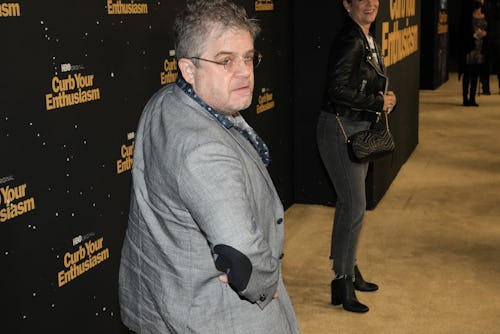Patton Oswalt just found out how complicated it is to be Dave Chappelle's friend
Dave Chappelle is causing his friends to choose between their own growth and him.

Patton Oswalt started his year learning personal growth sometimes means distancing yourself from the past. After posting a photo with Dave Chappelle from New Year's Eve, Oswalt had to decide between his comedy fraternity or his personal allyship with the LGBTQ community and chose both...for now.
On Saturday, Oswalt shared a series of photos of himself and Chappelle on Instagram with a glowing caption that described the joy of performing on New Year's Eve at Seattle’s Climate Pledge Arena with “a genius that I started comedy with 34 years ago.” The comment section of the post was a microcosm of the ongoing debate over Chappelle’s offensive LGBTQ humor: some claimed Oswalt turned his back on a community of people who supported him, while others described the union as the sort of tolerance Chappelle needs in order to evolve. Either inspired by the negative comments, his inner circle, his conscience, or all three, Oswalt made a follow-up post the next day to provide further context. The before/after photos paint a hilariously stark difference: one has pride and wistfulness of years of memories, the other has pensiveness bordering on shame.
In the lengthy post, the Emmy Award-winning comedian tried his best to stay close enough to his longtime friend to maintain the friendship, yet distance himself enough so Chappelle’s stench doesn’t become his new cologne whenever people see him in public. Before definitively stating he and Chappelle “100% disagree about transgender rights & representation,” he spent the first two paragraphs extolling Chappelle’s brilliant contributions to our understanding of race, briefly summarized their 34-year friendship as “bad & good gigs, open mikes & TV tapings,” and gushed about how Chappelle is the funniest comedian he’s ever met. He stated he is an “LGBTQ ally” before admitting to deleting comments from LGBTQ writers critical of his decision to post a photo with Chappelle in order to have a “‘nice comment thread’ about the pic with my friend.” But, when Oswalt posted the original photo with Chappelle, he wasn’t oblivious to the LGBTQ community he is an ally of, he was simply showing fidelity to a comedian community that, despite some exceptions, has always chosen its own over the hurt of others.
Whether you believe in the existence or effectiveness of “cancel culture,” the discussion of it over the last five years has exposed the defensive nature of comedy circles. When Louis C.K. admitted in November 2017 to masturbating in front of multiple women, his comedian contemporaries came out in droves to defend and explain his objectively horrendous behavior. Sarah Silverman went on Howard Stern’s SiriusXM Radio show and reasoned that Louis didn’t understand the harm of his actions, since she would either happily let him masturbate in front of her or rebuff his advances. During his The Bird Revelation stand-up special on Netflix, Chappelle said he found Louis’s behavior hilarious, felt the punishment leveled at Louis was disproportionate to his crime, and claimed a woman comedian who accused Louis of sexual misconduct needed tougher skin if him masturbating in front of her ruined her comedy dreams. Oswalt’s tug of war between defending his comedy brotherhood while also seeking acceptance from outsiders looking in is the basis of comedy.
Stand-up comedians have to balance the desire to be liked enough to garner laughs, and to be autonomously rebellious enough to take the crowd on whatever journey they choose. The comedian’s relationship with the audience boils down to asking a question: “I know what’s funny, but can you confirm that for me?” Oswalt wasn’t oblivious of the hurtful comments his longtime friend has said before posting the New Year’s Eve photo, and his deleting comments critical of his decision is evidence of the insulated bubble that comedians perpetuate to say and do reprehensible things while escaping punishment. At the same time, his personal growth with LGBTQ issues is beginning to become incompatible with his loyalty to a comedy fraternity that is more archaic than progressive; the Chappelle fiasco means that one day, Oswalt he may have to one day make a choice.